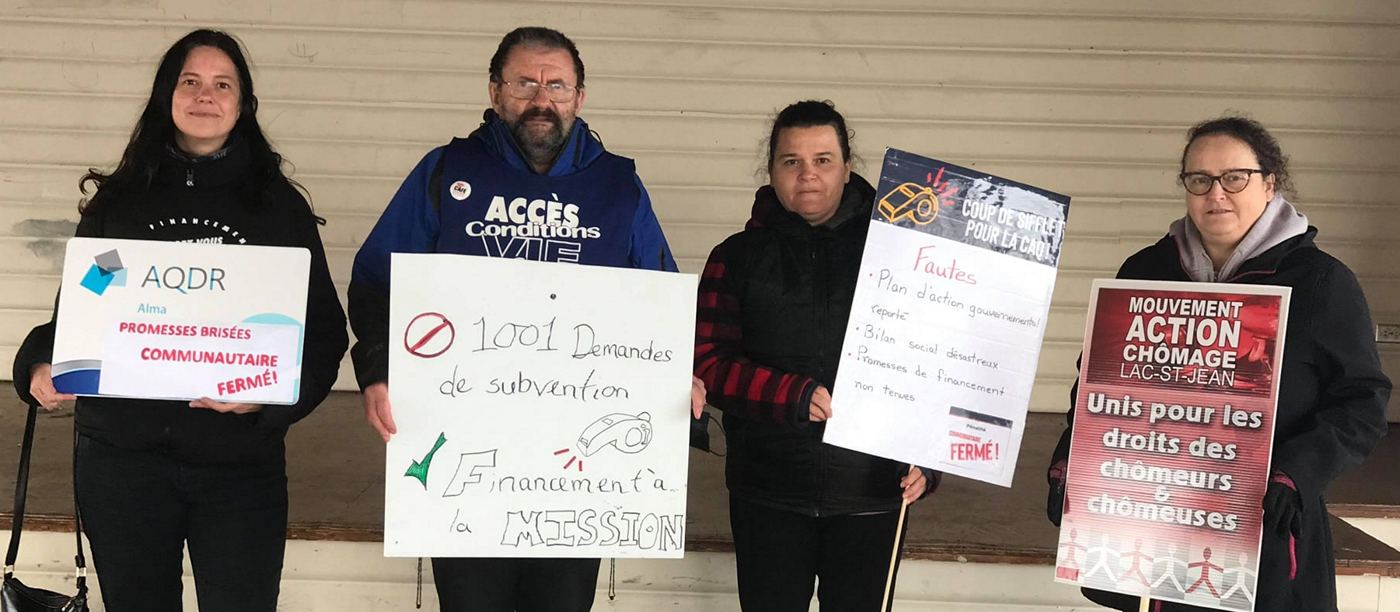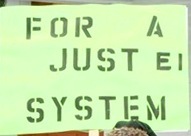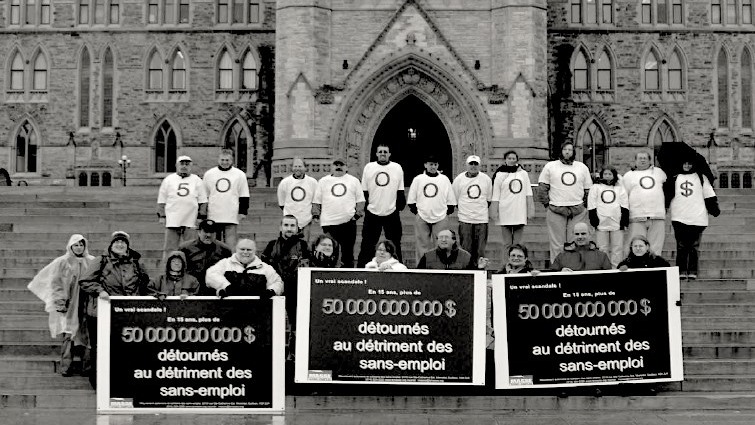|
October 29, 2021 - No. 101
Canadian Union of Public Employees Members in
New Brunswick Begin Strike Action
All Out to Support Workers' Struggle for Their Rights and in Defence of
Public Services!

Rally in Sackville for frontline workers, August 28, 2021.
Unemployed Workers Week
• Advocacy Organizations Highlight Urgency of Defending Rights of Unemployed
• Regressive Changes Made to Employment Insurance Regime Over the Years
Canadian Union of Public Employees Members in
New Brunswick Begin Strike Action
 The
Canadian Union of Public Employees -- New Brunswick, (CUPE NB)
announced around 5:00 am this morning that strike action by members of
10 locals is beginning today. Picket lines have been set up in various
locations across the province starting at 6:00 am The union will
provide more information later today as events unfold. Workers’ Forum
supports the workers' strike for their rights and for the services and
calls on all workers in Canada to provide all the support they can. The
Canadian Union of Public Employees -- New Brunswick, (CUPE NB)
announced around 5:00 am this morning that strike action by members of
10 locals is beginning today. Picket lines have been set up in various
locations across the province starting at 6:00 am The union will
provide more information later today as events unfold. Workers’ Forum
supports the workers' strike for their rights and for the services and
calls on all workers in Canada to provide all the support they can.
In its October 27 press release, CUPE NB announced that mediated talks between the CUPE
Centralized Bargaining Team and the government of New Brunswick ended
that day, after the government broke off talks. CUPE's centralized team
represents ten locals and
approximately 22,000 members. Most locals have been waiting for new
collective agreements for over four years. Their members' wages have
stagnated and declined over the past twelve years, mostly as a result
of wage freezes and recurring one per cent wage increases. According to
CUPE, in addition to impoverishing public sector workers in New
Brunswick, who are now the lowest paid in Canada, this has also
aggravated the serious problem of retaining workers as well as
attracting workers to the public service and has even caused
out-of-province labour migration.
Speaking to the union's demands, CUPE NB President Steve Drost wrote
in the release: "We moved significantly from our initial demand,
expecting some reciprocity and goodwill from the government, but that
did not happen."
The union informs that in order to obtain a settlement, it reduced
its wage demands. It lowered its
wage demands to a three per cent increase per year for a 4-year
contract, without concessions. In its last offer, the government put
forward a two per cent wage offer for a 5-year contract, along with an
unacceptable
concession on the issue of pensions, especially given that this
centralized negotiation was supposed to be about wages only. On the
morning of October 27, government negotiators simply walked away from
the table for the second time in as many months.
Premier Blaine Higgs told reporters that his offer is now off the
table and that the government has nothing else to offer. "We're not
going higher," he stated.
With regard to the pension concession, Steve Drost had this to say to Workers' Forum:
"The government wants to convert two defined-benefit pension plans
of locals in the education sector to [that of] a shared-risk model,
which the members are opposed to. And it wants to make that part of the
negotiations. He is holding the other locals hostage [saying that]
either you convert your pensions or none of you is getting anything and
you can hit the streets. Nobody gets a raise and we have members who
have been waiting for a collective agreement for five years. This is
entirely unacceptable."
"The members of our ten locals have said enough is enough. They want
to hit the streets and we are holding planning sessions right now. The
public has really rallied to our side, which is wonderful. They
recognize the value of our workers. They also recognize that this
Premier is not playing fair. I am very proud of our members. We are
fighting to protect all New Brunswickers and the public services."
The government continued its provocations by saying it is prepared
to pass back-to-work legislation or even use the powers it says it has
under the Emergency Measures Act in emergency situations, such as it decreed in response to the worsening COVID-19 pandemic.
The demands of New Brunswick's public sector workers for conditions
they deem acceptable to themselves and essential for the delivery of
public services are just. That is the issue here. The demands of the
New Brunswick government are unjust. The claim being laid by public
sector workers that they must be able to deliver services without
becoming impoverished and having to constantly face a serious retention
and recruitment problem which decimates the workforce is necessary, one
which defends the interests of all the people and of the society as a
whole.

Unemployed Workers Week

Marking unemployed workers' week in Lac St. Jean, October 25, 2021.
October 25-31 is Unemployed Workers
Week across Quebec.
On this occasion, advocacy organizations working with unemployed
workers are highlighting the need for immediate measures and a thorough
reform of the employment insurance system, to ensure that workers have
a decent, Canadian-standard income that allows them to live a dignified
life. One of the main interventions is to denounce the
arbitrary and discriminatory nature of the eligibility criteria for
employment insurance, which results in barely 40 per cent of unemployed
workers being entitled to benefits.
 In a video produced for the Week, the Unemployment Action Movement, Montreal, states: In a video produced for the Week, the Unemployment Action Movement, Montreal, states:
"Less than half of workers will be protected if they are unemployed,
despite having paid into employment insurance benefits during all their
working years.
"[...] As soon as you quit, you're no longer entitled to benefits.
We have several cases where people who resigned because of harassment,
because of practices by their employer that run counter to the law,
will end up with absolutely nothing when they leave their job. [...] At
present, only salaried employees, people who pay into employment
insurance, are protected. This excludes self-employed workers,
on-demand workers, commonly referred to as gig workers. Eligibility
criteria for employment insurance are very stringent. This is something
we've been denouncing for over thirty years. To have access to
employment insurance, you have to have worked a certain number of hours
in
the last year. This is to verify whether you are part of the labour
market. This criterion of number of hours worked in the last year has
more than doubled over the last 25 years. The system is difficult to
access for workers with precarious jobs. One can just imagine someone
working part-time at minimum wage ending up with 55 per cent of
nothing. [Benefits are set at 55 per cent of the claimant's wage during the period prior to their job loss -- WF Ed. Note.]"
 One
example of such arbitrary measures is the adoption, in late September,
of so-called transitional measures by the federal government as it
prepares for a comprehensive reform of the system. One of these
measures includes the establishment of a national, universal threshold
for benefit eligibility of 420 hours of work. Advocacy organizations
support the introduction of a national threshold of hours, even though
many are calling for it to be lowered. However, they remain critical
about the fact that the number of weeks of benefits is to be based on
the number of hours worked and on the official unemployment rate of the
region in which the claimant lives. Concretely, this means that for
420 hours of work, the claimant will be entitled to approximately 14
weeks of benefits. This means, amongst other things, that seasonal
workers will not be entitled to a sufficient number of weeks of
benefits to cover the period before their seasonal work kicks in. They
will be without income during a period of time that the unemployed call
the
"black hole." One
example of such arbitrary measures is the adoption, in late September,
of so-called transitional measures by the federal government as it
prepares for a comprehensive reform of the system. One of these
measures includes the establishment of a national, universal threshold
for benefit eligibility of 420 hours of work. Advocacy organizations
support the introduction of a national threshold of hours, even though
many are calling for it to be lowered. However, they remain critical
about the fact that the number of weeks of benefits is to be based on
the number of hours worked and on the official unemployment rate of the
region in which the claimant lives. Concretely, this means that for
420 hours of work, the claimant will be entitled to approximately 14
weeks of benefits. This means, amongst other things, that seasonal
workers will not be entitled to a sufficient number of weeks of
benefits to cover the period before their seasonal work kicks in. They
will be without income during a period of time that the unemployed call
the
"black hole."
Activists also point out that the consultation process announced by
the Trudeau government for the system's reform is a sham consultation
to justify inaction and the maintaining of the unacceptable status quo.
Already, the federal government's questionnaire initiating the
consultation is full of loaded questions. For example, it asks whether
respondents are willing to pay more in contributions to the regime if
eligibility for benefits is made easier. Or whether respondents think
that increased eligibility for benefits would worsen the labour
shortage problem.
Commenting on the consultation, the Autonomous and Solidarity Movement of the Unemployed (MASSE) writes:
"The government continues to cultivate a vagueness around this
second phase. Will workers and unemployed groups have the opportunity
to make their voices heard in an impartial process where the terms do
not disadvantage them from the start? In the end, the same groups that
file briefs and recommendations every year will file the same
criticisms and demands. Why would one expect anything different from
this process? [...] For MASSE, one thing is certain: the establishment
of an accessible, fair, universal and non-discriminatory employment
insurance system can no longer be the subject of eternal debate."
 MASSE
and its member organizations have also used social media to elaborate
various aspects of an employment insurance system that would protect
all the unemployed. In particular, a virtual discussion was
organized on October 26 to discuss a financially viable reform of the
system that would cover the needs of all the unemployed. One of
the proposals put forward was the restoration of federal government
contributions to the EI fund. The federal government ended its funding
in 1990 as part of its austerity measures under the hoax of reducing
the budget deficit. Another proposal dealt with the use of the EI fund
for “support measures” that are supposed to help the
unemployed find work. Often these are used to deny workers’
benefits. The participants agreed that the funds contributed by
workers and employers to the EI fund should only be used for benefits
for those who are without work. “Support measures” should
be entirely separate, not linked to EI eligibility, and funded
independent of the EI fund. MASSE
and its member organizations have also used social media to elaborate
various aspects of an employment insurance system that would protect
all the unemployed. In particular, a virtual discussion was
organized on October 26 to discuss a financially viable reform of the
system that would cover the needs of all the unemployed. One of
the proposals put forward was the restoration of federal government
contributions to the EI fund. The federal government ended its funding
in 1990 as part of its austerity measures under the hoax of reducing
the budget deficit. Another proposal dealt with the use of the EI fund
for “support measures” that are supposed to help the
unemployed find work. Often these are used to deny workers’
benefits. The participants agreed that the funds contributed by
workers and employers to the EI fund should only be used for benefits
for those who are without work. “Support measures” should
be entirely separate, not linked to EI eligibility, and funded
independent of the EI fund.
Although they vary according to organization, the demands of
unemployed workers' advocacy organizations all seek to establish a
single, universal national threshold of hours worked that allows for
the maximum number of unemployed workers to access benefits;
significant increases in the amount of benefits and their duration; the
inclusion of
self-employed and on-demand workers; an end to the total exclusion of
workers who lose their jobs through so-called voluntary departure or
who are fired; and access to regular employment insurance benefits in
the case of having lost one's job, irrespective of whether one received
maternity and parental benefits.
The fight for the rights of unemployed workers is a just struggle
that is an integral part of the struggle of the working class for its
rights and for a new direction for the economy, one which serves the
needs of the people, not narrow private interests. Employment insurance
cannot be based on the vagaries of the labour market. It must be a
social program to protect the unemployed from an economic system that
neither capable nor designed to provide employment and a livelihood for
all.
Workers' Forum firmly
supports the work of the defence organizations of unemployed workers to
ensure that they have what they need and are entitled to in order to
live a life in dignity.


Ottawa
picket in 2005 on the occasion of the 70th anniversary of the On to
Ottawa trek opposed money taken out of the unemployment insurance
system.
Successive federal governments have consistently made
the eligibility criteria and conditions of the Employment Insurance
program more unfavourable to workers. Here are some of the major
changes that have been made since the early 1990s.
In 1990, the Conservative government of Brian Mulroney passed a law
whereby the federal government ceased its contributions to what was
then called unemployment insurance. This was done in the name of
fighting the federal government's budget deficit, one of the major
themes of the anti-social offensive. Since then, only workers and
employers pay into the system.
In 1993, the Conservative government passed legislation that imposed
the loss of benefit entitlement for those deemed to have voluntarily
left their jobs without justification or to have lost their jobs due to
"misconduct" (in the case of dismissal, for example).
In 1994, the Liberal government of Jean Chrétien reduced the
benefit rate from 57 per cent to 55 per cent of the claimant's salary.
The Conservative government had reduced the rate from 60 per cent to 57
per cent.
In 1996, the Liberal government introduced a series of major changes
to the program, which became the Employment Insurance (EI) Program.
Eligibility and duration of benefits were now based on hours of work
rather than weeks of work. This change from weeks to hours negatively
impacted many workers, affecting part-time workers in a particularly
brutal way. This is seen as one of the key measures that has rapidly
reduced eligibility for EI to fewer than 50 per cent of the unemployed.
In another measure, the maximum number of weeks payable in EI benefits
has been reduced from 50 to 45 weeks.
It is on the basis of these measures that the program accumulated
huge so-called surpluses and $57 billion was transferred into the
government’s general revenues to be used for its schemes to pay
the rich. In 2008, Stephen Harper's Conservative government closed the
old employment insurance account. This administrative decision made
official the theft of the EI fund!
 In 2012, Stephen Harper's Conservative government imposed other
major regressive reforms of the EI system. Among other things, the
government created separate classes of unemployed workers; frequent
claimants, occasional claimants and long-tenured workers, who no longer
have the same rights and are not subject to the same
obligations. The most targeted workers are frequent claimants, defined
as those who have filed three claims in the last five years or who have
received regular benefits for 60 weeks or more. They now had to accept
a lower wage than others in their job search or their benefits were cut
off. A frequent claimant now had to look for a similar or different
job and accept a wage equivalent to 70 per cent of his or her former one
starting in the 7th week of his or her benefit period. They also had to
accept such work an hour or more commuting time from their homes. In 2012, Stephen Harper's Conservative government imposed other
major regressive reforms of the EI system. Among other things, the
government created separate classes of unemployed workers; frequent
claimants, occasional claimants and long-tenured workers, who no longer
have the same rights and are not subject to the same
obligations. The most targeted workers are frequent claimants, defined
as those who have filed three claims in the last five years or who have
received regular benefits for 60 weeks or more. They now had to accept
a lower wage than others in their job search or their benefits were cut
off. A frequent claimant now had to look for a similar or different
job and accept a wage equivalent to 70 per cent of his or her former one
starting in the 7th week of his or her benefit period. They also had to
accept such work an hour or more commuting time from their homes.
The Harper government also created the Social Security Tribunal,
which replaced the former tripartite appeal bodies (chairperson, worker
representative, employer representative) for workers who want to
challenge decisions of the Employment Insurance Commission. The unemployed worker had to bring his or her case before a
single commissioner who does not even have to meet with him or her
personally. The meeting can be done by telephone or video conference. The
Trudeau government has reversed some of the Harper reforms, for
example, eliminating the categories of claimants and bringing back the
tripartite structure of the appeal process. But the other regressive
changes remain. Against
all these regressive changes, workers and organizations of the
unemployed demand that their voices be heard and that the Trudeau
government meet their demand for an accessible, fair, universal and
non-discriminatory employment insurance system. 
(To access articles individually click on the black headline.)
PDF
PREVIOUS
ISSUES | HOME
Website: www.cpcml.ca
Email: office@cpcml.ca
|

